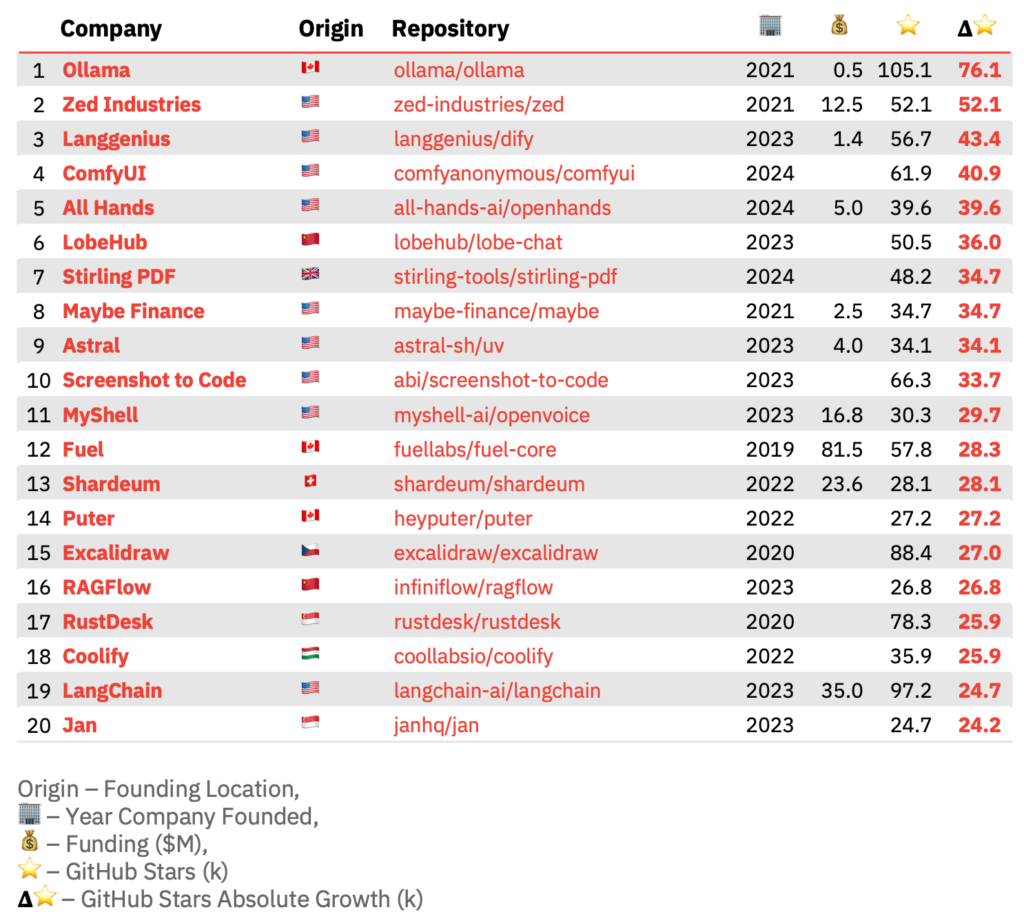A fresh report shines a spotlight on the 20 fastest-growing open source startups worldwide — and unsurprisingly, AI-focused companies dominate the list.
The latest findings come from European venture capital firm Runa Capital, which has tracked emerging open source startups through its Runa Open Source Startup (ROSS) Index since 2020. Updated quarterly, the index ranks projects based on their growth in GitHub “stars” — a simple but telling metric akin to social media “likes.”
Since 2023, Runa has released an annual report highlighting the most popular commercial open source startups of the year. And just like last year, AI is front and center in the 2024 ranking. Out of the top 20 companies, 11 are directly tied to artificial intelligence.
To make the cut, projects must meet strict criteria. Each must be backed by a commercial company, be less than 10 years old, have raised under $100 million, and operate independently — no subsidiaries or publicly listed firms are allowed. This ensures the list focuses on startups genuinely building businesses around their open source technologies.

Leading the 2024 ROSS Index is Ollama, a Y Combinator alum known for its open source platform that runs large language models like Meta’s Llama and DeepSeek locally on desktop. Ollama saw an impressive surge, adding 76,000 GitHub stars through 2024 — a 261% growth that pushed its total above 135,000 stars.
Close behind is Zed Industries, which created a cross-platform collaborative code editor built for seamless work between humans and AI. Though Zed’s project has been around, it only went open source in January 2024. It quickly picked up steam, earning over 52,000 GitHub stars in less than a year.
Taking third place is LangGenius, the team behind Dify, an open source development platform designed for building large language model (LLM) apps. Dify grew its star count by 326%, jumping from 13,000 to 57,000 stars — a figure that has since soared beyond 84,000.
In fourth is ComfyUI, a node-based tool designed for generating images, videos, and audio using generative AI models. Its star count jumped nearly 195% to 61,900 by the year’s end.
Rounding out the top five is All Hands, which launched OpenHands, an open source platform for building software development agents. It gathered 39,600 stars within months of its March 2024 launch, growing steadily since.
The 2024 ROSS Index reveals that while AI dominates, demand for developer tools and self-hosted software is thriving. Tools like Zed and Astral’s UV made strong showings, reflecting the enduring interest in productivity and coding platforms.
Interestingly, the list also features privacy-first tools like Stirling PDF for document manipulation, Maybe Finance for personal finance management, and RustDesk, a self-hostable remote desktop solution. Their inclusion signals growing demand for open-source alternatives that give users more control.
Meanwhile, Ethereum-based Fuel secured the 12th spot, proving that crypto and Web3 projects are still very much alive in the open source ecosystem.
Geographically, the report reveals San Francisco leads the pack with six startups on the list. Canada follows with three, while Europe — including the U.K., Switzerland, Hungary, and the Czech Republic — claims several spots. Startups from Singapore and China also made their mark.
While GitHub stars aren’t a perfect measure of success, they’re a useful indicator of developer interest and community momentum. Runa Capital carefully tracks absolute star growth over a year and relative growth over quarterly periods to balance short-term trends with long-term potential.
It’s also worth noting that Runa applies a flexible definition of open source. Projects released under licenses like the Server Side Public License (SSPL) still qualify — even if not officially recognized by the Open Source Initiative (OSI). This approach reflects how commercial perception of open source has evolved.
Ultimately, the ROSS Index offers valuable insight into where open source innovation is heading — and which companies are turning community-driven software into scalable businesses. From AI development frameworks to privacy tools and blockchain projects, open source remains a powerhouse for building the future of tech.













